
English_books / New Headway int sb
.pdf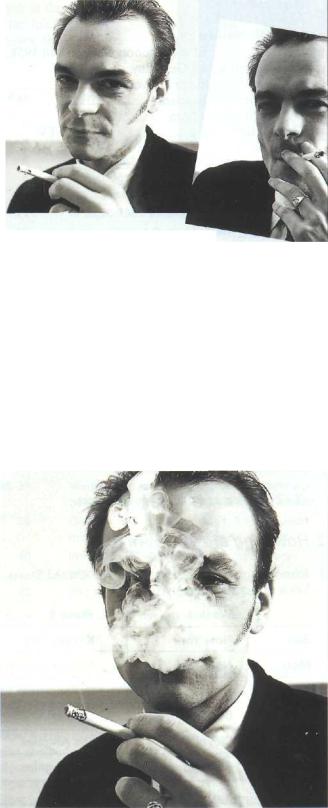
READING
Pre-reading task
1 Work in pairs. Which of the following do you think is the riskiest?
playing Russian roulette |
hang-gliding |
taking cocaine |
smoking tobacco |
riding a motorbike at 200 kph |
|
crossing the road with your eyes closed
2 Read the quotations about smoking. What view of smoking does each quotation express?
a'Out of a thousand smokers of 20 cigarettes a day, one will be murdered, six will be killed on the roads, and about three hundred and thirty will die prematurely because of their smoking.'
b'If you decide to give up smoking and drinking, you don't actually live longer; it just seems longer.'
c'Teenagers begin to smoke because they think it's cool and because they think they look grown-up. The cigarette is a symbol of defiance and an attack on authority'
d'I have every sympathy with the American who was so horrified by what he had read about the effects of smoking that he gave up reading.'
e 'The world spends SI50 billion a year on smokingrelated illnesses.'
3Have attitudes to smoking changed in your country over the past few years? How? Do as many people smoke?
4You are going to read an interview with a man called B J Cunningham. Look at the pictures and read these facts about him.
He's a chain smoker.
He wears black leather cowboy clothes.
He rides a Harley-Davidson motorbike.
He has a weak chest.
He returned to his true love after six months.
He has started his own tobacco company.
His company is not very successful.
He smoked fifteen cigarettes during the interview.
-How old do you think he is?
-What do you know about his way of life? What kind of a man do you think he is?
-What nationality do you think he is?
-Would you like to meet him?
Reading
Read the text.
Were your ideas about B J Cunningham correct?
Did you learn anything about him that surprised you?
'Here!
Have one of mine!'
'Death cigarettes? You must be joking!'
David Andrews meets B J Cunningham,
a dedicated smoker who loyally puffs his own cigarettes called Death.
100 Unit 10 Obsessions
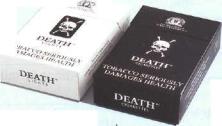
OK. So here are the facts. There's an Englishman called B J Cunningham who has been smoking since he was eleven. He's a chain smoker who's in love with smoking. He smokes between two and 5 three packets a day, and already, at the age of 30, has a weak chest. He was in hospital for six days when his lungs collapsed. 'It was at that point that
I did actually give up cigarettes for six months.' But then he returned to his true love. He wears black
10 leather cowboy clothes and has a fondness for classic Harley-Davidson motorbikes, which he has been riding for the past fifteen years. 'I've had about ten of them,' he says coolly.
So far, not a very remarkable life. But then, B J 15 Cunningham (no one actually knows what
B J stands for) had an idea one night in a bar in LA. 'Let's market a cigarette called Death,' he said to a business partner. 'Why?' said the partner.
20 'It's obvious,' he explains to me. 'When you take a packet of cigarettes out of your top pocket
and put it on the bar in front of you, you're making a statement about yourself, exactly as you
25 do with the clothes you wear, the music you like, and the newspaper you read. You're saying, "These cigarettes are a part of me/"
'So, if you take out a packet of Benson and Hedges, you're saying, "I'm classy — gold packet — part of
30 high society." If you take out a packet of Marlboro, you're saying, "I'm an outdoor type, I like wearing a cowboy hat and riding horses
'Now, if you produce a packet of Death cigarettes,' he continues, producing a packet of Death cigarettes
35 to illustrate his point, 'what you're saying is ...'
He looks at me to make sure that I'm going to write down what you're saying about yourself if you smoke Death cigarettes. But do I need to? We all know what Death cigarettes are about. B J
40 Cunningham has been telling us about them since he started his Enlightened Tobacco Company (ETC) in 1991.
Everyone has now got the joke, thank you very much. We've seen the black packets with their 45 death's head on the front and the white packets which are called Death Lights; and we've heard
about the coffin-shaped vending machines in pubs and clubs.
However, for anyone who has managed to avoid 50 B J's publicity, here goes. Death cigarettes are for the smoker who wants to say, 'Yes, I'm killing
myself, but at least I know it, and I smoke a brand which doesn't try to hide the fact.' 'Death cigarettes/ concludes B J, 'say, "Don't you dare tell me to
55 stop!"'
B J Cunningham, now on his ninth cigarette of the interview, says he wants to expose the hypocrisy behind the tobacco industry. Governments can't afford to ban smoking because
60 they receive huge amounts of money in tax. Tobacco companies try to improve their image by sponsoring sports events such as motor racing, rugby, football, cricket, and tennis, at vast expense. 'What everybody wants to forget is that smoking
65 kills. That's why I'm here, to remind people that smoking and death are linked.'
The ETC hoped to win a good share of the UK market. 'Cigarettes in Britain are a £12 billion industry in which four companies control 95% of the market. The question is: How
do we get a share?' He knows the question but he can't afford the answer.
The ETC can't afford to advertise like the 75 big companies. It has been losing about £1
million a year.
Personally, I have a very different opinion as to why so few people choose to smoke a brand of cigarette called Death. B J Cunningham has
so misunderstood human psychology. Of course smokers know that their habit is probably going to kill them, but they prefer not to think about it. The only people who are going to smoke his cigarettes are people like himself. When I offered one to a
85 friend recently, his reaction was, 'You must be joking.' And this is what Death cigarettes are all about. It's a joke that was funny, but isn't funny any more.
But B J is still obsessed by fags. 'Do you know the so main reason I love my job?' he says. 'It's because it
gives me a chance to attack the anti-smoking killjoys! Those puritans who try to control our lives. I've met many people who don't smoke, but who tell me that if smoking were made illegal, they
95 would fight it. You just can't have laws which control every aspect of the way people live.'
I finally started to warm to this character B J Cunningham. It was the end of the interview, and the number of fag ends in the ashtray had
ioo increased to fifteen. Perhaps he had something important to say after all. Not just, 'Hey, everybody! Look at me! I'm weird, and I'm killing myself!'
Obsessions Unit 10 101
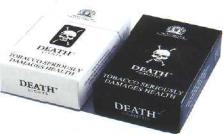
Comprehension check
Read the text more carefully. Complete the sentences with the best ending, a, b, or c.
1 B J Cunningham smokes two or three packets of
cigarettes a day ...
aeven though he has a weak chest,
bbecause he has to for his job.
cto prove that smoking is safe.
2 He wears cowboy clothes and rides a Harley-Davidson
motorbike because ...
ahe plays in a rock 'n' roll band.
bhe likes everything that comes from the States.
cit is part of the image he wants to create for himself.
3 B J Cunningham says that smokers choose a certain
brand of cigarettes ...
abecause it shows the kind of person they are.
bto go with the clothes they are wearing.
cbecause they want to be sporty or part of high society.
4 We get the impression that the interviewer ...
alikes and admires B J Cunningham.
bis bored and irritated by B J Cunningham.
cis very angry with B J Cunningham.
5 B J Cunningham says Death cigarettes are for
people ...
awho want to be honest and aggressive.
bwho want to prove that smoking cigarettes doesn't kill.
cwho want to expose the hypocrisy of governments and the tobacco industry.
6B J Cunningham says that his job ...
a is to get sponsorship for sports events, b is to sell as many cigarettes as he can.
c is to be honest about the dangers of smoking.
7The interviewer thinks that the ETC hasn't been successful because ...
athe big tobacco companies spend £12 billion on advertising.
beverybody thinks that Death cigarettes are just a joke.
csmokers don't want to be reminded that smoking kills.
8 B J Cunningham ...
awants to defend people's right to smoke.
bwants to control the lives of smokers.
cthinks that smoking will one day be made illegal.
9 |
The interviewer warms to B J Cunningham at the end |
|
of the interview ... |
a |
when B J Cunningham gives his main reason for |
|
selling Death cigarettes. |
b |
because he realizes that he is just a weird eccentric, |
c |
when he finally puts out his last cigarette. |
Language work
Here are the answers to some questions. Write the questions.
1 |
|
|
|
? |
|
Since he was eleven. |
|
|
|
2 |
|
|
|
? |
|
Between forty and sixty. |
|
||
3 |
|
|
|
? |
|
|
|
|
|
|
Yes, he has. He gave up for six months after his lungs |
|
||
|
collapsed. |
|
||
4 |
. |
|
|
? |
|
For fifteen years. |
|
||
5 |
|
|
|
? |
|
About ten. |
|
|
|
6 |
|
|
|
? |
|
In 1991. |
|
|
|
7 |
|
|
|
? |
|
About £1 million a year. |
|
|
|
8 |
|
|
|
? |
|
Fifteen. |
|
|
|
Discussion
Discuss the following in small groups. Then report back to the whole class.
1 How much is a packet of cigarettes in your country? How much of that is tax?
What sort of health warnings are there?
Do tobacco companies sponsor any sports events?
2Why is it that drugs such as nicotine and alcohol are legal in many countries, while other drugs are illegal?
3Do you think smoking should be banned in all public places? Or, should smokers be allowed to smoke when and where they want?
102 Unit 10 Obsessions
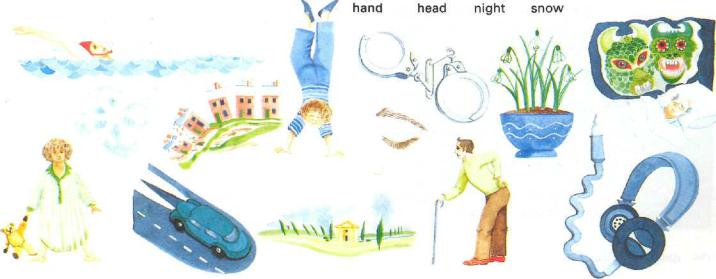
VOCABULARY AND PRONUNCIATION
Compound nouns
1 The following are definitions of words from Unit 10. What are the words?
Example
What you wear if you want to listen to your Walkman.
Headphones.
aThe piece of paper that means you can drive a car.
bWhat you have to pass to get the piece of paper!
cWhat you put on the walls of your house
when you decorate a room,
dAn interview given to a lot of journalists to make an announcement.
eSomeone who smokes one cigarette after another.
fSomeone that you run a business with.
gWhere smokers put out their cigarettes. What do you notice about these words?
2Nouns can be combined to make a new word. These are called compound nouns. They are written in different ways.
postcard
postbox One word. postman
postcode
post office |
Two words. |
Occasionally the words are hyphenated {window-shopping). There are no rules, and English people themselves often have to go to a dictionary to check the spelling.
T.74 Listen to the words. Where is the stress?
3 Put one word in each box to form three compound nouns. Look at the example. Check the spelling in a dictionary.
a |
tooth |
ache |
i |
|
|
conditioning |
|
|
brush |
|
|
|
|||
|
|
|
|
|
|
||
|
|
|
paste |
|
|
|
port |
|
|
|
|
|
|
|
|
b |
dining |
|
i |
|
|
cup |
|
|
living |
|
|
|
|
|
spoon |
|
changing |
|
|
|
|
pot |
|
|
|
|
|
|
|
|
|
c |
|
|
lights |
k |
|
|
glasses |
|
|
|
warden |
|
|
|
bathing |
|
|
|
jam |
|
|
|
set |
|
|
|
|
|
|
|
|
d |
|
|
way |
1 |
news |
||
|
|
|
racing |
|
travel |
|
|
|
|
|
bike |
|
estate |
||
|
|
|
|
||||
e |
cookery |
|
m wrapping |
||||
|
telephone |
|
|
|
writing |
|
|
|
note |
|
|
toilet |
|||
|
|
|
|
|
|
||
f |
|
|
engine |
n |
chair |
||
|
|
|
place |
|
fire |
|
|
|
|
|
works |
|
dust |
||
|
|
|
|
|
|
|
|
g |
birthday |
|
0 |
|
|
centre |
|
|
credit |
|
|
|
|
|
basket |
|
get-well |
|
|
|
|
spree |
|
|
|
|
|
|
|
|
|
h |
|
|
dresser |
P |
|
|
case |
|
|
|
brush |
|
|
|
shop |
|
|
|
cut |
|
|
|
worm |
4Work in pairs.
Look up the words below in your dictionary and find more compound nouns. Write some sentences like those in Exercise 1 to test the other students in the class.
eye back land
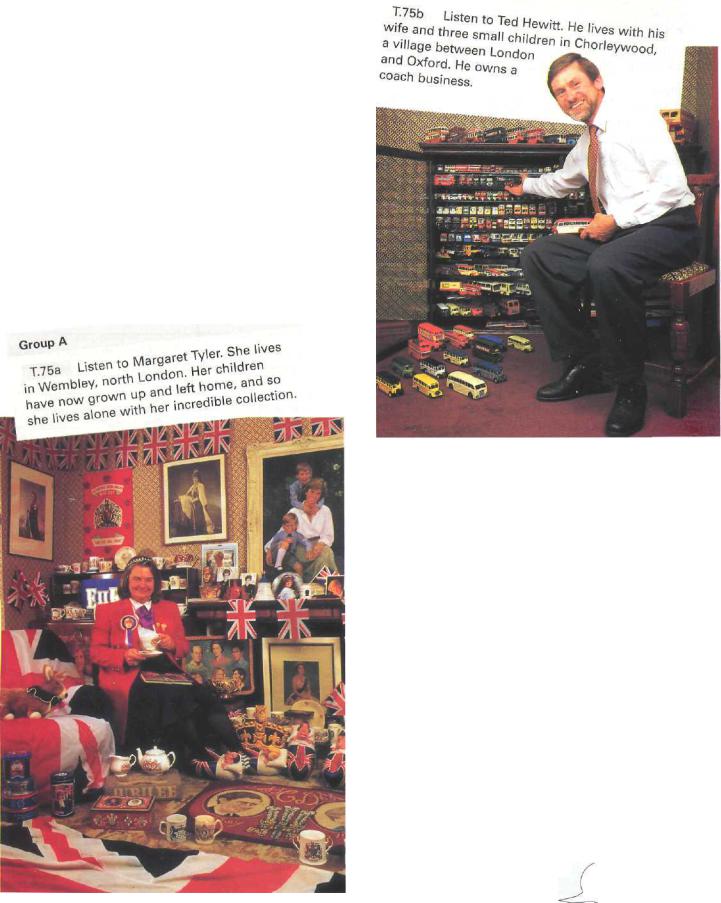
LISTENING AND SPEAKING
Collectors
Pre-listening task
1 What kinds of things do people often collect?
2 Do you collect anything? Did you use to when you were younger?
Listening
You are going to listen to two people who are both keen collectors. Divide into two groups.
Look at the picture about your person. What can you see? What does she/he collect? What questions would you like to ask her/him? Listen and answer the questions.
Group B
Comprehension check
1 Where does she/he live? Who with?
2What does she/he do for a living?
3How big is her/his collection?
4How long has she/he been collecting?
5How many rooms of the house are taken up with the collection?
6What's her/his favourite piece?
7How much has the collection cost?
8Where do the pieces come from?
9Is she/he in touch with other people who share the same hobby?
10 What ambitions does she/he have?
When you have answered the questions, find a partner from the other group. Compare and swap information.
Guessing game
Your teacher will tell one student what he or she collects. The others must ask questions to find out what it is.
How big are they? |
Can you buy them? i |
When you've guessed what it is, |
|
ask some of the questions in the |
How long have you |
Comprehension check above. |
been collecting? |
104 Unit 10 Obsessions
WRITING
Beginning and ending letters
1 Match the correct beginning and ending for the five
letters on the right. Which letter ...
... |
asks for information? |
... |
accepts an invitation? |
... |
invites? |
... |
gives news? |
... says that money has been received?
2 Which of these sentences continues each letter?
aCould you please send me your brochure and a price list? I would be most grateful,
bI've changed my job a few times since I last spoke to you, and as you know, I've moved, too.
cUnfortunately this amount did not include packing and postage, which is £7.50.
dJune and I are having a barbecue with all our friends, and we were wondering if you could come,
eWe'd love to come. I haven't been to your part of the country for ages.
3 Note the following points about formal and informal letters.
•We can write contractions (I've, we're, I'll) in an informal letter, but not in a formal one.
•All letters begin with Dear ...
•You can end an informal letter with Best wishes or Love.
Here are some useful phrases for informal letters:
Beginning
It was lovely to hearfrom you. I was pleased to hear that ...
Thank you for your letter. I was sorry to hear that ...
I'm sorry I haven't written before, but ...
This is just a note to say ...
Giving news
We're having a lovely time in ...
I've been very busy recently. Last week I... and next week I'm going to ...
Ending
I'm lookingforward to seeing you .. .Ho hearingfrom you soon.
Give my regards to Robert ...
Write to me soon ...
I hope to hear from you soon ...
Write and tell me when ...
4Write a letter to a friend who you haven't been in touch with for a long time. Give your news, describe some things that you have done recently, and say what your future plans are. Ask about his/her news and family. Try to arrange to meet somewhere. Remember to put your address and the date in the top right-hand corner of your letter.
Beginnings
a Dear Mary
This is just a note to ask if you and Dave are free on the evening of July 11.
b Dear Jane
Many thanks for your letter. It was lovely to hear from you after such a long time. You asked me what I've been doing. Well, ...
c Dear Sir/Madam
I saw an advertisement in the Daily Telegraph for weekend breaks at your hotel.
d Dear Peter
Thank you so much for inviting Dave and me to your summer party.
e Dear Mr Smith
We received your order for the World Encyclopaedia on CD ROM, and your cheque for £75.
Endings
1 Many thanks. I look forward to hearing from you in the near future.
Yours faithfully
James Fox
2We will have pleasure in meeting your order as soon as we can.
Yours sincerely
Thames Valley Computer Software
3 It would be lovely to meet some time. Do you ever come to London? You must let me know.
Love
4Do get in touch soon and tell me if you can make it. Regards to you all.
Best wishes
5We're really looking forward to seeing you again, and to meeting your friends.
Best wishes
Obsessions Unit 10 105
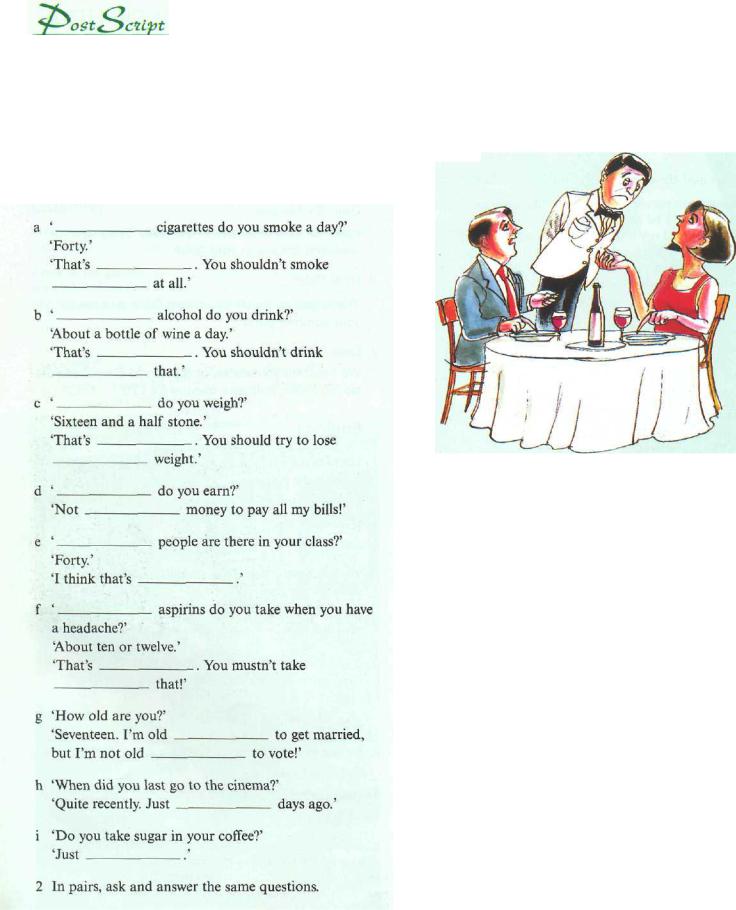
Complaining
1 Choose a word or words from the box to complete the sentences. Some are used more than once.
too much |
a few |
any |
How many |
as much as |
How much |
some |
too many |
as many as |
enough |
a little |
|
3 Write a dialogue of complaint, either in a restaurant, a hotel, or a clothes shop. Act it out to the rest of the class.
Example
Waiter
How was your meal, madam?
But apart from that?
Lady
ft was terrible. The soup was too salty, the steak wasn't cookedenough, and thereweren'tenough vegetables. The table was too noisy and the waiters wereslow.
It wasfine, thanks.
106 Unit 10 Obsessions
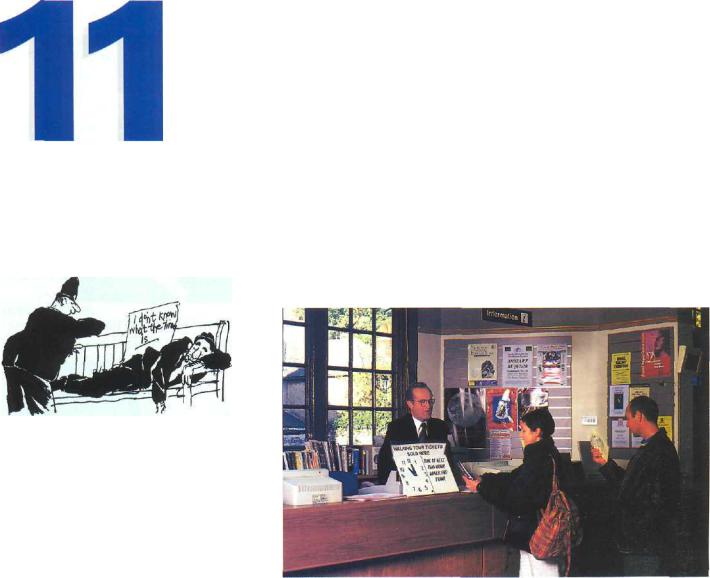
Tell me about it!
Indirect questions
Question tags
Informal language
Test your grammar
1 T.76 Look at the picture. Read and listen to the story.
PRESENTATION (1)
Indirect questions
1 1.11 Rosie has just arrived at the railway station of a strange town. She goes to the tourist office to get some information.
The Tramp
A tramp was sleeping on a park bench late at night. A man and woman were walking past. One of them tapped him on the shoulder and asked, 'Excuse me! What's the time?' The tramp was very annoyed at being woken up. 'I don't know!' he said angrily. 'I haven't got a watch.' And he went back to sleep.
Some time later another man was passing. He woke the tramp up and said, 'I'm sorry to bother you, but I wonder if you could tell me what time it is.'
Again the tramp said that he didn't know. By now he was very fed up, so he got a pen and a piece of paper and wrote I DON'T KNOW WHAT THE TIME IS on it, and went back to sleep.
Half an hour later, a policeman was passing. He read the sign, woke the tramp up and said, 'It's 2.30, sir.'
2Correct these sentences.
*l wonder if you could tell me what time is it.
*l don't know what's the time.
Look at the information she wants, then listen to the dialogue. Complete her sentences.
|
What Rosie wants to know |
What Rosie says |
|||
a |
Could you help me? |
I wonder |
|
||
b |
What time do the banks close? |
I don't know |
|
||
c How old is this town? |
Have you any idea |
||||
d |
Are we near the centre of town? |
I'm not sure - |
|
||
e Which hotel did you suggest? |
I can't remember _ |
||||
•Grammar questions
-How does the word order change in indirect questions?
-What happens to doldoesldid in indirect questions?
-What do we use if there is no question word {where? how old? whattime?)1
Tell me about it! Unit 11 107
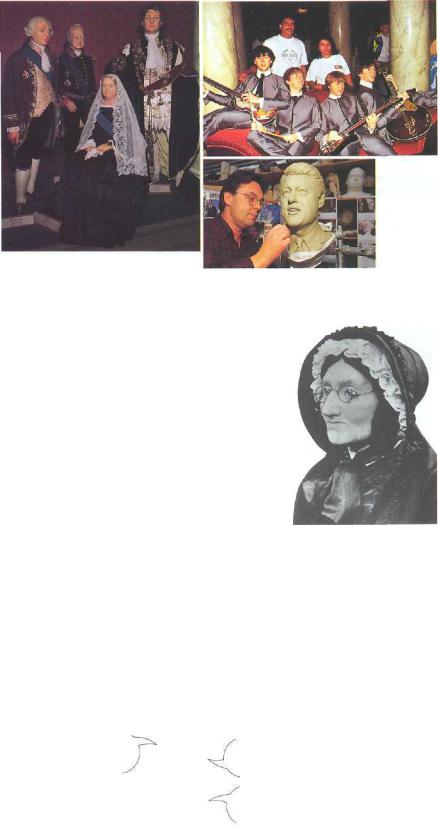
2In pairs, practise the conversation, How much can you remember?
3Here is some more information that Rosie wants. Use the prompts to ask indirect questions.
aWhen was the town founded? (Could you tell me ...?)
bWhat's the population of the town? (Do you know ...?)
cWhere can I change some money? (I'd like to know ...)
dWhat's the exchange rate today? (Do you happen to know ...?)
eIs there a dry cleaner's near here? (I wonder ...)
fWhere is there a cheap place to eat? (Have you any idea ...?)
gHow long does it take to get to the centre of town from here? (Can you tell me ...?)
hDid it rain here yesterday? (Do you remember ...?)
4In pairs, ask and answer similar indirect questions about the town where you are now.
PRACTICE
1 We can't hear what she's saying!
l T.78 Listen to the radio news. Unfortunately the reception is bad, and there are some things you can't hear. What don't you
know? |
|
|
Example |
|
|
We don't know |
what time the |
|
We've no idea |
||
traincrash |
||
I couldn't hear |
||
happened. |
||
I'm not sure |
||
|
2 Your teacher has the information. Ask the direct questions.
2 Speaking
1 Madame Tussaud's Waxworks is London's most popular tourist attraction. What do you know about it?
Make statements about Madame Tussaud's using the prompts
I wonder ... |
I haven't a clue ... |
I'd love to know ... |
Does anybody know ... |
Example where ... born
I wonder where she was born.
awhere Madame Tussaud ... (come) from
bwhen ... alive
chow ... (learn) to make things in wax
dwhich countries ... (live) in
e... married
f... children
gwhy ... (go) to England
hwhen the Waxworks ... (open) in London
ihow many people a year ... (visit) the Waxworks
2Work in pairs. Your teacher will give you some information about Madame Tussaud, but you will not have the same information. Ask and answer questions to complete the information. Use both direct and indirect questions.
Example
Student A
Marie Tussaud was born in Strasbourg in 1761. Her father died ... (When?), and her family moved to Switzerland.
Student B
Marie Tussaud was born in Strasbourg in 1761. Her father died two months before she was born, and her family moved to ... (Where?)
Do you know when |
He died two months |
|
her father died? |
||
before she was born. |
||
|
||
|
Where did her |
|
To Switzerland. |
family move to? |
108 Unit 11 Tell me about it!

3 Asking polite questions
1 Match a word in A with a line in B and a line in C.
A |
B |
C |
|
|
|
|
football team |
times have you been on a plane? |
What |
newspaper |
does it take you to get ready in the morning? |
|
colour |
do you support? |
|
long |
shoes do you take? |
Which |
size |
of car have you got? |
|
flavour |
do you read? |
|
far |
ice-cream is your favourite? |
How |
sort |
is it to the station from here? |
|
many |
time do you spend watching TV? |
|
much |
eyes have you got? |
Indirect questions can be more polite than direct questions. In pairs, ask and answer indirect questions using the ideas in Exercise 1.
Example
Could you tell me which >. football team you support?^
„
Would you mind telling me what size shoes you take?
• - - |
. |
PRESENTATION (2)
Question tags
1 T.79 Look at the picture and listen to Jessie (J), aged 3, talking to her mother, Sarah (S).
J Mummy?
S Yes, Jessie?
J I've got ten fingers, haven't I?
S Yes, that's right, my darling. Ten lovely little fingers. J And my brother's called Joe, isn't he?
S Yes, he is. He's at school at the moment.
J And Daddy went to work this morning, didn't he? S Yes, he went in his big blue car.
J And we don't like tigers, do we, Mummy?
SWell, they're beautiful, but they're dangerous, it's true.
J Can I have a biscuit now, Mummy?
2 Look at the dialogue between Caroline Bailey (C) and her secretary, Norma (N). Fill each gap with the correct question tag. Choose from the box.
|
didn't I? |
aren't I? |
isn't it? |
||
|
am I? |
haven't I? |
does it? |
||
C Now, what's happening today? I've got a meeting |
|||||
|
this afternoon, |
|
|
? |
|
N Yes, that's right. With Henry and Ted. |
|||||
C |
And the meeting's here, . |
|
|
||
N No, it isn't. It's in Ted's office, at 3.00. |
|||||
C Oh! I'm not having lunch with anyone, |
|||||
N No, you're free all morning. |
|||||
C Phew! I'll start on that report, then. Er ... I signed |
|||||
|
all my letters, |
? |
|
||
N |
No, you didn't, actually. They're on your desk. |
||||
waiting for you.
C Ah, right! And tomorrow I'm going to Scotland, N Yes. You're booked on the early morning shuttle.
C |
OK. It doesn't leave until 8.00, . |
? |
|
N |
8.15, to be precise. |
|
|
C Gosh, Norma! Where would 1 be without you? T.80 Listen and check your answers.
•Grammar questions
-Jessie knows that she has ten fingers, and she knows that her brother's called Joe. So she's not really askinj questions. What is she doing?
-How do we make question tags?
Grammar questions
Did the intonation of Jessie's question tags go up or down? What about Caroline's?
Whose use of question tags means, 'I'm not sure so I'm checking'? Whose use of question tags means, 'Please talk to me'?
Tell me about it! Unit 11 109
